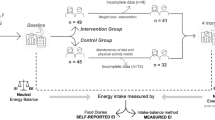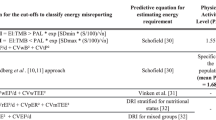Abstract
Objective: To test the validity of a dietary questionnaire which was developed with the particular goal of measuring dietary intake in obese subjects.
Design: Reported energy intake was compared with 24 h energy expenditure measured in a chamber for indirect calorimetry (24 EE) and reported nitrogen intake with nitrogen in urine collected during the 24 h in the chamber.
Subjects: Twenty-nine overweight men and women, body mass index (BMI) ranging from 25.5–49.5 kg/m2.
Results: Reported energy intake correlated significantly with 24 EE (r=0.50, P=0.006) and reported urinary nitrogen correlated significantly with urinary nitrogen excretion (r=0.56, P=0.0015). Mean reported energy intake±s.d. was 10.2±3.6 MJ and mean 24 EE±s.d. was 10.3±1.9 MJ. Although this difference was small and non significant, it indicates some underreporting if one can assume that these overweight subjects are less physically active in the chamber than in free-living conditions. Reported nitrogen intake also suggested underreporting at the group level. However, when the data were analysed at the individual level it was clear that the underreporting errors did not increase with increasing degree of obesity.
Conclusions: Previous studies with the SOS dietary questionnaire have demonstrated that it is possible to obtain plausible energy intakes from both obese and nonobese subjects. This present analysis further demonstrates that the questionnaire discriminates overweight subjects with high and low intakes of energy and protein, using unbiased biomarkers to judge validity. These data provide additional support for the usefulness of the SOS dietary questionnaire.
Sponsorship: Supported by grants from the Swedish Medical Research Council (05329 and 11653).
This is a preview of subscription content, access via your institution
Access options
Subscribe to this journal
Receive 12 print issues and online access
$259.00 per year
only $21.58 per issue
Buy this article
- Purchase on Springer Link
- Instant access to full article PDF
Prices may be subject to local taxes which are calculated during checkout
Similar content being viewed by others
Author information
Authors and Affiliations
Rights and permissions
About this article
Cite this article
Lindroos, A., Lissner, L. & Sjöström, L. Does degree of obesity influence the validity of reported energy and protein intake? Results from the SOS Dietary Questionnaire. Eur J Clin Nutr 53, 375–378 (1999). https://doi.org/10.1038/sj.ejcn.1600732
Received:
Revised:
Accepted:
Published:
Issue Date:
DOI: https://doi.org/10.1038/sj.ejcn.1600732
Keywords
This article is cited by
-
Impact of weight change, secular trends and ageing on cardiovascular risk factors: 10-year experiences from the SOS study
International Journal of Obesity (2011)
-
Racial Differences in Correlates of Misreporting of Energy Intake in Adolescent Females*
Obesity (2006)
-
Relationship of high energy expenditure and variation in dietary intake with reporting accuracy on 7 day food records and diet histories in a group of healthy adult volunteers
European Journal of Clinical Nutrition (2002)



